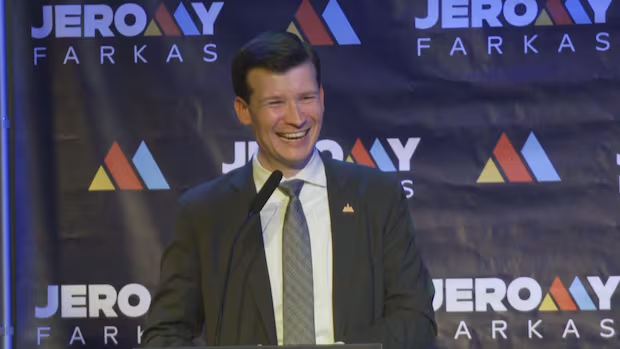Only about 1 in 10 eligible voters picked Jeromy Farkas for mayor. Will that matter?

In an election marked by low voter turnout and tight margins between several candidates, Jeromy Farkas ended up winning Calgary’s mayoral race with only about one out of every 10 eligible voters checking his name on the ballot.
For some, it will trigger the question — what exactly does that say about the mandate of the city’s new mayor?
A political mandate refers to the sense of legitimacy an elected leader wields, based on the number of votes they receive.
The larger the vote share, the larger the mandate that leader might be seen to have. They will then implement their policies with what can be assumed is the broad support of the electorate.
Vote breakdown
Farkas beat his closest rival, Sonya Sharp, by 616 votes following Monday’s recount, according to the city.
He was actually propelled to the mayor’s office with fewer votes than the number that landed him in second place against Jyoti Gondek in 2021: just over 91,000 this time, compared to 116,000 last election.
As it stands, Farkas earned about 26 per cent of the ballots cast in an election that saw 39 per cent voter turnout.
And that’s where the math comes in.
“You’ve got somebody with the mandate just north of 10 per cent,” said Mount Royal University policy studies professor Lori Williams.
But Williams says at the end of the day, the fact that a small number of Calgarians chose the next mayor does not detract from his win.
“Now, that doesn’t mean that that it wasn’t a fair win, but what it does mean is that it’s going to be very important for the new mayor to reach out to those who didn’t vote for him,” she said.
Stewart Prest, a political science lecturer at the University of British Columbia, agrees outreach can be important for a leader who did not receive an overwhelmingly big share of the votes.
“In situations like this, elected politicians really have to pay attention, to continue to listen to voters between elections. And they can’t just assume that the message delivered on election night was the only one that matters,” said Prest.
And of course the mayor’s power will be limited, not only because of the scope of municipal responsibilities, but because Calgary’s weak mayoral system means Farkas will be just one vote out of 15 at city hall.
“The mayor is going to have to find ways to take the temperature and work with the councillors that he has to work with,” said Prest.
Mandate myth?
What could be considered “low” voter mandates are nothing new. Canada’s first-past-the-post system means federal and provincial leaders are elected after earning a plurality of votes, regardless if that translates to a majority of total electors.
Dennis Pilon, chair of the politics department at Toronto’s York University, says that is one reason he sees mandates as a political myth.
“Given that our parties are often elected to majorities with far less than a majority of the popular vote, that’s the first reason why the whole idea is suspect,” said Pilon.
“The other problem with the mandate idea is that it assumes that the public is very well informed on the things that the politician’s claiming a mandate for. And we know they aren’t.”
Pilon says that means while voters might be familiar with or like some of what a candidate has to offer, they may not know and support every policy promise.
Prest notes that leaders are often elected not because of a full-throated endorsement of their policies, but rather as a vote against an incumbent or another candidate running.
“We’re choosing candidates among others, but it’s not always clear what voters are focusing on when they make the choice,” said Prest.
Jeromy Farkas promised to work for all Calgarians, whether they voted for him or not, during his post-election news conference on Oct. 21. (CBC)
Farkas addresses his mandate
In a post-election interview, the incoming mayor was asked on CBC Radio’s Calgary Eyeopener what kind of mandate he now boasts, given the number of votes he earned.
Farkas said he sees there being broad consensus across the city on the need to address some of the key issues on which he campaigned.
“We have a strong mandate to be able to deliver for Calgarians on those safety and affordability challenges,” said Farkas.
LISTEN | Jeromy Farkas speaks to Calgary Eyeopener after his election win:
Calgary Eyeopener9:49Jeromy Farkas elected Mayor of Calgary
The next Mayor of Calgary – pending a recount – joins us. We speak with Jeromy Farkas.
Farkas also said he sought a mandate running as an independent, and classifies his win as a clear rejection of the party system introduced by the province in Calgary and Edmonton this election.
In his first news conference after the election, Farkas addressed those 90 per cent of Calgarians eligible to vote who did not choose him.
“To every Calgarian, whether you voted for me or not, I will be your mayor. I will work alongside you, listen to you, and stand up for you every single day,” Farkas said Tuesday.
To York University’s Pilon, that willingness to listen is key — and another reason to forget the focus on mandates.
“I think for people to bury this idea of the mandate, it’s probably a good thing because all it does is encourage politicians not to listen to people,” said Pilon.
“If they’re saying ‘I’ve got a mandate,’ they’re saying ‘I’m finished listening to people,’ and you know, ‘Now I’m going to ram this through.'”





